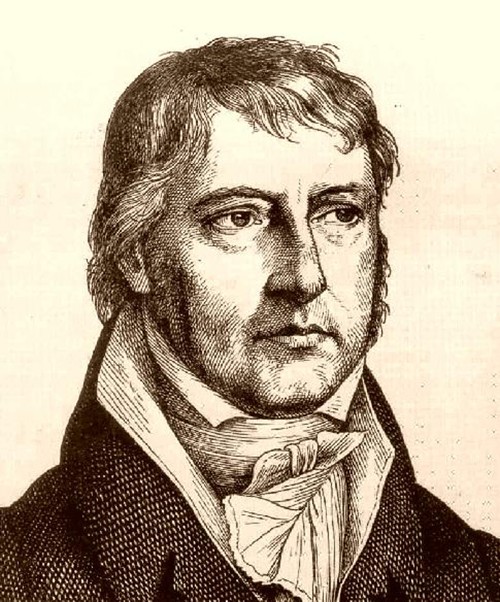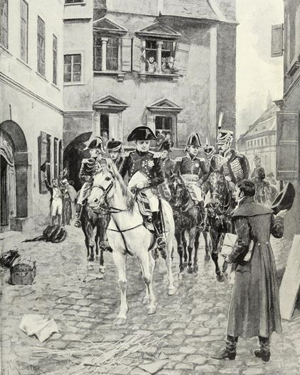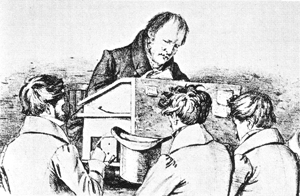
Your complimentary articles
You’ve read one of your four complimentary articles for this month.
You can read four articles free per month. To have complete access to the thousands of philosophy articles on this site, please
Hegel & History
G.W.F. Hegel: An Introduction
Matt Qvortrup observes the watcher of the world spirit.
No philosopher has been more influential in the modern age than Georg Wilhelm Friedrich Hegel (1770-1831). He has inspired individuals as diverse as Karl Marx, Francis Fukuyama, and, latterly, the football manager Jose Mourinho. “Have you ever read Hegel?” the former Manchester United boss asked a baffled journalist at a press conference in 2018.
The oldest son of a civil servant from south-west Germany, Georg Hegel was born a quarter of a millennium ago, in 1770. As a theology student in Stuttgart, Hegel feared that he would become a Populärphilosoph – a populariser of complex theories. There was little danger of that! In fact, few thinkers are as difficult to understand. Hegel himself in his monumentally dense Phenomenology of Spirit grumbled about the “complaints regarding the unintelligibility of philosophical writings from individuals who otherwise possess the educational requirements for understanding them.” But being difficult to read does not mean he is wrong. It is odd that we are content to carefully analyse a mathematical proof, willing to ponder poetry again and again, but often not willing to do the same with philosophy. Critics of Hegel’s philosophy sometime fail to understand that this roommate of the romantic poet Friedrich Hölderlin sought to combine the stringency of mathematics with the beauty and grace of the poetic. We should, for this reason, follow Hegel when he says that philosophy must be “read over and over before it can be understood” (Phenomenology of Spirit, p.39).
To understand Hegel, it is also essential to appreciate that he wrote in the shadow of Immanuel Kant (1724-1804). In many ways, his whole philosophy was an elaborate reply to Kant’s conclusion in Critique of Pure Reason (1781) that it’s not possible to understand the essence of the real world. Like Kant, Hegel accepted that all understanding of the world must start with the individual’s perception. But unlike his illustrious predecessor, Hegel believed it was possible to understand the world as it really is, independent of the limitations of human sensation and thought – to understand the ‘thing-in-itself’, or noumenon, as Kant also called it. Reality, Hegel insisted, is not something existing independently of our minds, but the product of our interaction with the world, and the essence or nature of reality is what he calls Geist, often translated as ‘mind’, or ‘spirit’. His philosophy essentially consists in recounting, first how the Subjective Spirit grows, when we gain self-consciousness; then how the Objective Spirit – the spirit of a culture – comes to fruition, when we realize that we can only be free in a society of other individuals in a State; and finally how the Absolute Spirit of all history reaches its apotheosis or highpoint of self-recognition, in humanity, via art, religion, and above all, philosophy.

The original young Hegelian: young Hegel himself
Hegel vs Philosophy
This was a grand scheme, a theory of everything worked out in detail and involving whole new methods of philosophical enquiry. Hegelian idealism became extraordinarily influential worldwide, inspiring innumerable 19th and 20th century philosophers called Hegelians, who took liberties with the master’s ideas while applying them to every area of thought. However, not all of Hegel’s own contemporaries were as impressed. Søren Kierkegaard (1813-55), who spent much of his short life criticising Hegel, observed that “A thinker erects an immense building… and we discover… that he himself personally does not live in this high vaulted palace, but in a barn alongside it… or, at most, in the porter’s lodge” (The Sickness unto Death, p.176-177). At least the Dane was polite in his polemic. The same could not be said for Arthur Schopenhauer (1788-1860), who was a colleague of Hegel’s at the University of Berlin and said that Hegel was, “dishing out pure nonsense, slapping together senseless raving tangles of verbiage such as had only ever been heard in a lunatic asylum” (The World as Will and Representation, p.456). This onslaught against Hegel was also characteristic of English-language philosophy in the early Twentieth Century, after G.E. Moore and Bertrand Russell had led a revolt against the so-called ‘British Hegelianism’. But whereas Kierkegaard and Schopenhauer had taken issue with Hegel’s metaphysics, by the 1940s writers such as Sir Karl Popper and Bertrand Russell, often with scant textual evidence, were denouncing Hegel as a proto-fascist. In The Open Society and Its Enemies Vol. II, Popper called him “the missing link between Plato and modern totalitarianism” (p.31, 1945). Bertrand Russell, for his part, claimed that for Hegel, ‘Freedom’ was “the right to obey the police” (A History of Western Philosophy, p.671, 1945). That Hegel was a defender of the rule of law and adamant that “subjective freedom must be respected” (Outline of the Philosophy of Right [PoR], 1820, p.262), seems to have been conveniently overlooked by them. But the man singled out as the defender of the Prussian police-state was anything but a nationalist. Indeed, he described that creed as the “pure selfishness of empty pride” (PoR, p.10). Unlike Plato, Rousseau, and Hobbes – to name but three – Hegel’s stated aim was not to “construct a state as it ought to be”, but only “to show how the [actual] state, the ethical universe, should be understood” (p.15).
Towards the end of the Twentieth Century, the negative view of Hegel in the English-speaking world began to change. Hegel’s occasional liberal utterances prompted John Rawls, arguably the greatest political philosopher of the Twentieth Century, and a liberal, to describe him as a ‘moderately progressive reform-minded liberal’ (The History of Moral Philosophy, p.330, 2000). But this, too, is a simplification. For starters, Hegel’s supposed ‘liberalism’ is certainly at odds with his view that ‘war is not an absolute evil’ – that “just as the blowing winds preserve the sea from stagnation, so also stagnation in peoples would be the product of prolonged, let alone absolute peace” (PoR, p.324).
This remark, as well as his defence of capital punishment (PoR, p.100), might be taken as merely a reflection of the time in which he lived. Hegel would have endorsed this interpretation. Indeed, he was the first philosopher who really embraced the idea that our views are a product of our times. In The Philosophy of Right (first published 200 years ago in 1820) he espoused the view that “whatever happens, every individual is a child of his time.”
Hegel vs History
To understand Hegel’s philosophy, one should not so much focus on, say, his defence of constitutional monarchy or other contemporary political concerns, but on his fundamental idea that “the history of the world is none other than the progress of the consciousness of freedom” (Lectures on the Philosophy of History, 1837, p.19). But for Hegel ‘freedom’ was not the ability to do as we please – an idea which in his view revealed “an utter immaturity of thought” (PoR, p.15). Rather, “the beginning of self-knowing… [is] genuine freedom. This real freedom consists precisely in giving to each moment of rationality its own consciousness” (PoR, p.279). (The quote indicates how Hegel was not inclined to write in simple-to-understand sentences.)
Aristotle had talked about how all things actualise their potential (Metaphysics, 1048b1–3). Hegel adopted this perspective, but on a grander scale. The aim of his philosophy was to understand the process of history; the unfolding of the Spirit in its different forms, which is Spirit actualising its potential. And for Hegel, history could only be understood in retrospect. This was what he meant when he famously wrote that “philosophy’s grey in grey cannot be rejuvenated. The owl of Minerva begins its flight only with the falling of dusk” (PoR, p.16).
History is at the core of Hegel’s thinking, then. Another key point is the famous ‘dialectic’. It is no coincidence that the classicist Hegel used the Greek word dialektikós about his method. ‘ Dialektikós’ can be translated as ‘relating to dialogue or debate’, and for Hegel, the history of the world is an on-going conversation. This dialogue takes place in different situations, but the basic structure of history is always the same: opposites clash and are overcome.
Hegel always thought in terms of opposites that had to be overcome. Later interpreters often speak in terms of this overcoming of opposites as being a synthesis of the opposites (the Kung Fu movie star Bruce Lee wrote his degree thesis on ‘Hegel’s Theory of Synthesis’), but the German word Hegel used was Aufhebung, which means ‘to overcome’, but which can also mean ‘to lift up’, or ‘to abolish’. For instance, in his Science of Logic (written in 1812, when he was a school principal), he talked about how ‘being’ and ‘nothingness’ could together be ‘lifted up’ or ‘overcome’ in the term ‘becoming’.

Hegel greets Napoleon as he rides into Jena (from Harper’s Magazine, 1895)
The most famous example of the process of dialectic is to be found in The Phenomenology of Spirit, a book he wrote while a penniless lecturer in Jena in 1806, while Napoleon’s troops were closing in on the city. Our philosopher was in trouble on several other fronts, too. He was late with his manuscript, and his married landlady had fallen pregnant with his child. As befits a man who would go on to write about the ‘ethical life’, Hegel paid child support to the mother, and the child later lived with him. It wasn’t merely his manuscript that was late; Hegel was a late developer generally. His other roommate at university, Friedrich Schelling, had become a full professor at the tender age of twenty-three. By contrast, Hegel’s early adulthood had been spent as a private tutor for wealthy middle-class families. But philosophically, everything was beginning to come together for Hegel.
Hegel vs Other People
Maybe it was the experience of obscurity that prompted him to make ‘recognition’ (Anerkennung) another central tenet of his early philosophy.
In a famous part of The Phenomenology of Spirit beginning with Section 188, Hegel writes about how self-consciousness only emerges when one conscious individual meets another. As self-consciousness develops in both, they each seek recognition from the other, but they also fear one another. In this battle of wills – ‘the battle unto death’ as Hegel calls it – one finally submits and becomes the slave, the other becomes the master. Yet, soon, the relationship begins to be reversed. The master cannot gain adequate recognition from someone he does not regard as his equal. Moreover, as the master delegates work to the slave, the slave becomes creative. In this way, through work, the slave, “becomes conscious of what he truly is”; he “becomes aware… that he himself exists essentially and actually in his own right” (Phenomenology, p.196). Thus through fear and service the slave becomes the creative being, whereas the master becomes ‘alienated’.
Yes, the idea of ‘alienation’ was introduced by Hegel not Marx! But it’s not difficult to see why Karl Marx later proclaimed himself as Hegel’s ‘pupil’ (Capital, p.10). However, Hegel was a good deal more socially conscious than Marx gave him credit for.
For Hegel, the master-slave relationship and its dynamics is the beginning of the dialectic. In the social sphere – the realm of ‘the objective spirit’, to use Hegel’s term – the family (‘the immediate substantiality of spirit characterised by love’, PoR, p.158) was contrasted to ‘bourgeois society’ (as ‘ die bürgerlige Gesellschaft’ is best translated). The bourgeois element was the part of society in which “each individual is his own end [and] everything else is nothing to him” (PoR, p.182). It is not difficult to see why Marx and Engels described bourgeois, capitalist society as one in which, there is “no other nexus between man and man than naked self-interest, than callous cash payment” (The Communist Manifesto, p.82, 1848). They were, indeed, pupils of Hegel’s.

Hegel lecturing
Tellingly, Hegel was no less concerned about the plight of the poor than Marx. The founder of communism wrote that the capitalist class had ‘pitilessly torn asunder’ the existing social order (Communist Manifesto, p.82). Hegel, with similar indignation, decried how the market economy “tears the individual from his family ties, estranges members of the family from one another” (PoR, p.238). But unlike Marx, Hegel recognised that the market mechanism could play a role in social improvement, and that it was preferable to maintain the capitalist system, albeit with a heavy dose of state intervention. As he wrote, “the differing interests… may come into collisions with each other and although the right relation between them on the whole comes about automatically, still its adjustment requires a control that stands above both” (PoR, p.236). Without state intervention in the economy, massive inequality would result, since capitalism brings with it “conditions which greatly facilitate the concentration of disproportionate wealth in a few hands” and as a result, “the standard of living of a large mass of people fall[s] below a certain level of subsistence… The result is the creation of a proletariat of paupers” (p.244). For this reason, the aim of the state is not to safeguard negative freedoms (the freedom not to be interfered with in one’s pursuits, as in the philosophy of John Locke), nor to uphold traditional morality (as in Thomas Aquinas). The ‘state’ for Hegel is not just what we would call the ‘public sector’, but is an organism which reflects the spirit of a people. It includes “both the law permeating all relationships within the state and also at the same time the customs and consciousness of its citizens” (p.274). So the way Hegel uses the word ‘state’ is better understood as ‘nation’ or ‘people’. For Hegel, all people are the product of a gradual and evolutionary historical process, during which different groups gradually overcome their opposition to each other and achieve a new equilibrium. It was in this sense of history developing towards integration that Hegel wrote the famous words that “what is rational is actual, and what is actual is rational” (p.14).
Hegel found that social differences could be overcome, and he believed that history proved this. But unlike Marx (and Kant), Hegel was not an internationalist or revolutionary. Every nation had grown at its own pace, and for this reason “every people has a constitution that is appropriate to it and suitable for it” (p.274). One implication of this is that reforms imposed from the outside are doomed to failure. For an example, Hegel wrote that when Napoleon “wished to give to the Spaniards a constitution… the project turned out badly… [For] a constitution is not something manufactured; it is a work of centuries… as the consciousness of rationality is developed in a particular people” (p.274). Hegel thinks this also means that all dreams of federations between nations – an idea espoused by Immanuel Kant in his essay ‘On Perpetual Peace’ (1795) – are flawed from the outset.
Tentative Conclusions
Hegel was a poetic metaphysician and keen observer of concrete facts, but he also strove to create the ultimate philosophical system. Did he succeed?
Towards the end of his life he wrote, “So now the temple is erected for God; his house stands ready, external nature has been wrought into shape, and suddenly it is pierced by the lightening bolt of individuality” (Introductory Lectures on Aesthetics, 1820s, p.125). Hegel was proud of his ‘high vaulted palace’ of objective history, but he could still appreciate what it was like to dwell individually ‘in the porter’s lodge’.
© Dr Matt Qvortrup 2020
Matt Qvortrup is Professor of Political Science at Coventry University.









